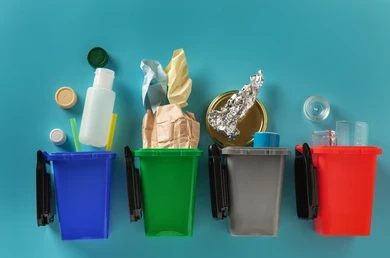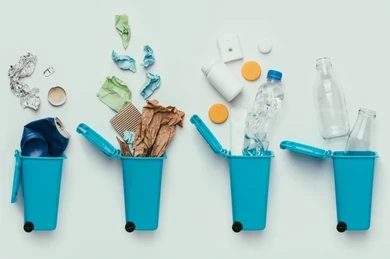There is need for a proper solution for plastic wastes since plastic waste is a growing environmental concern that is affecting ecosystems worldwide. Plastics are synthetic, non-biodegradable materials that take hundreds of years to decompose, polluting landfills, oceans, and other natural habitats in the process. The rise in plastic production and consumption, coupled with poor waste management practices, has led to a global plastic pollution crisis.
The impact of plastic waste on the environment is significant. In landfills, plastics take up valuable space and release harmful chemicals as they slowly degrade. Plastic waste that ends up in oceans and other water bodies poses a severe threat to marine life, which can ingest or become entangled in plastic debris. This not only harms the animals themselves but also affects entire ecosystems, potentially leading to reduced biodiversity.
The consequences of plastic waste extend beyond the environment. Plastic pollution also has economic and social impacts. Coastal communities, for example, rely heavily on tourism and fisheries, both of which are negatively impacted by plastic waste in the oceans.
Plastic waste also poses a risk to human health, as the chemicals released during plastic degradation can contaminate food and water sources.
To address the plastic waste crisis, governments, businesses, and individuals must take action. Governments can implement policies and regulations to reduce plastic production and promote sustainable waste management practices.
Businesses can develop innovative solutions to reduce plastic packaging and increase the use of biodegradable materials. Individuals can make small changes in their daily lives, such as using reusable bags, water bottles, and straws, to reduce plastic waste.
Plastic waste is a complex and urgent environmental issue that requires collective action to address. It is essential to raise awareness about the consequences of plastic waste and implement sustainable solutions to reduce its impact. By working together, we can make a difference in protecting our planet and ensuring a sustainable future for generations to come.
The Ultimate Solution for Plastic Waste

Plastic waste has become a significant environmental challenge, with millions of tons of plastic waste produced every year. This waste causes severe damage to our planet’s ecosystem, including wildlife, oceans, and the atmosphere. However, the good news is that there is an ultimate solution for plastic waste.
One of the most significant contributors to plastic waste is rigid plastic, which is commonly found in packaging materials, bottles, and containers. This type of plastic is difficult to recycle, and as a result, it often ends up in landfills, where it can take hundreds of years to decompose. However, with the development of new recycling technologies, rigid plastic can now be recycled into a variety of new products, reducing the amount of plastic waste that ends up in landfills.
To take advantage of these recycling technologies, it’s essential to find a plastic recycling center near you. Many communities have dedicated recycling centers that accept a wide variety of plastic waste, including rigid plastic. By recycling your plastic waste, you can help reduce the amount of waste that ends up in landfills and contribute to a more sustainable future.
One type of plastic that is often misunderstood is acrylic plastic. This type of plastic is commonly used in a wide range of applications, from display cases to signage to furniture.
Despite its many uses, many people are not aware of what is acrylic plastic and how it can be recycled. Acrylic plastic is a thermoplastic that can be melted down and recycled into new products. When properly recycled, acrylic plastic has a much lower impact on the environment than other types of plastic.
Read Also: The Products Derived From Green Wastes
Another way to reduce plastic waste is by reusing plastic products, such as plastic pots. Plastic pots paint are commonly used for gardening and can be reused multiple times before they need to be disposed of.
Additionally, plastic pots can be painted to give them a new look and extend their lifespan. By reusing and repurposing plastic products, we can reduce the amount of plastic waste that ends up in landfills and contribute to a more sustainable future.
Plastic waste is a significant environmental challenge that requires action from all of us. By taking advantage of new recycling technologies, finding plastic recycling centre near me, and reusing and repurposing plastic products, we can significantly reduce the amount of plastic waste that ends up in landfills. Let’s all work together to create a more sustainable future.
The ultimate solution for plastic waste requires a collaborative effort from governments, businesses, and individuals. Governments can play a vital role in reducing plastic waste by implementing policies and regulations that promote recycling and reduce the production of single-use plastics. Businesses can also take responsibility by adopting sustainable practices, such as using eco-friendly packaging and reducing their plastic waste output.
Individuals can make a significant impact by being conscious of their plastic consumption and recycling habits. In addition to recycling and reducing plastic waste, innovation in biodegradable and compostable plastics is also a promising solution. These types of plastics are designed to break down naturally in the environment, reducing their impact on wildlife and ecosystems.
However, it’s important to note that biodegradable and compostable plastics should still be disposed of properly to avoid contamination and pollution. Moreover, educating the public about the impact of plastic waste on the environment is crucial. Many people are not aware of the harmful effects of plastic waste on the planet, and educating them can encourage them to adopt more sustainable behaviors.
Education can also promote the adoption of alternative materials and products that have a lower environmental impact. The ultimate solution for plastic waste requires a multi-faceted approach that includes recycling, reducing, innovating, educating, and collaborating. By working together, we can significantly reduce the impact of plastic waste on our planet and create a more sustainable future for generations to come. Let’s all take action and do our part to make a positive change.
One of the most significant challenges in addressing plastic waste is the lack of infrastructure for proper disposal and recycling. Many communities do not have access to plastic recycling centers, and even when they do, the infrastructure may not be sufficient to handle the amount of plastic waste produced. As a result, plastic waste often ends up in landfills or is improperly disposed of, causing environmental damage.
To address this challenge, it’s essential to invest in the development of infrastructure for proper disposal and recycling of plastic waste. This includes building new recycling centers, improving existing infrastructure, and investing in technologies that make recycling more efficient and cost-effective.
By increasing access to recycling centers and improving recycling technologies, we can significantly reduce the amount of plastic waste that ends up in landfills and promote a more circular economy.
Read Also: Hazardous Waste Complete Management Guide
Another solution for plastic waste is the adoption of a circular economy model, which aims to reduce waste and promote the reuse of materials. In a circular economy, products and materials are designed to be reused and recycled, creating a closed loop system that reduces waste and conserves resources. By adopting a circular economy model, we can significantly reduce the amount of plastic waste produced and promote a more sustainable future.
Lastly, it’s essential to remember that small actions can make a significant impact. By making small changes in our daily lives, such as using reusable water bottles and bags, avoiding single-use plastics, and properly disposing of plastic waste, we can contribute to a more sustainable future. These actions may seem small, but they add up and can make a significant difference in reducing plastic waste.
Addressing plastic waste requires a multi-faceted approach that includes infrastructure development, adoption of a circular economy model, and individual action. By working together and taking collective action, we can significantly reduce the impact of plastic waste on our planet and create a more sustainable future for generations to come. Let’s all take responsibility and do our part to make a positive change.
When it comes to rigid plastic, it’s essential to note that not all types of plastic can be recycled. Some types of plastic, such as polystyrene, are difficult to recycle and may not be accepted by recycling centers. However, many types of rigid plastic, such as PET and HDPE, are widely accepted for recycling and can be turned into new products, reducing the amount of plastic waste that ends up in landfills.
Additionally, it’s crucial to understand what acrylic plastic is and how it can be recycled. Acrylic plastic, also known as PMMA, is a type of plastic commonly used in products such as signage, displays, and light fixtures. While acrylic plastic is not as widely accepted for recycling as other types of plastic, it can still be recycled in some cases. Some recycling centers accept acrylic plastic, but it’s essential to check with the recycling center near you to see if they accept it.
Another solution for reducing plastic waste is to repurpose plastic pots by painting them. Plastic pots are commonly used in gardening and can accumulate over time. Rather than throwing them away, consider painting them and using them for different purposes, such as organizing small items or as decoration. This is a simple and creative way to reduce plastic waste and repurpose items that would otherwise be discarded.
In conclusion, addressing plastic waste requires a combination of solutions, including recycling, infrastructure development, adoption of a circular economy model, and individual action. By working together and taking collective action, we can significantly reduce the impact of plastic waste on our planet and create a more sustainable future. Let’s all take responsibility and do our part to make a positive change.
Read Also: Jumpstart Your Day with Carnation Instant Breakfast

